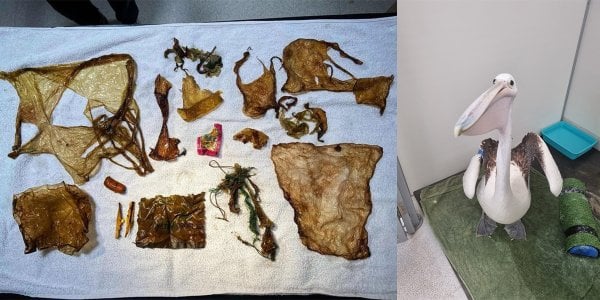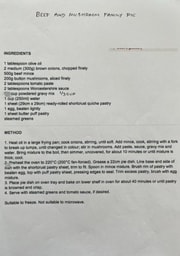Pelican problem: Striking images show human rubbish turns majestic birds into bins
- Replies 1
Content warning: This article contains depictions of items found inside an animal's body that may be unsettling for some. Reader discretion is advised.
The pelican, a bird celebrated in verse for its impressive bill, has become an unwitting victim of modern waste, with disturbing consequences.
The iconic Australian pelican, known for its vast wingspan and large throat pouch, is facing a crisis that's far from poetic.
In a recent alarming revelation, WA Wildlife, a non-profit animal rehabilitation organisation, has shared confronting images that starkly illustrate the impact of human litter on these majestic birds.
The images, which may unsettle some viewers, depict the contents of a pelican's stomach, revealing a collection of plastic bags, wrappers, and even more bizarrely, nappies.
One particularly distressing photo showed the damage inflicted on a pelican's lower pouch, torn by a swallowed fish hook.
Another heartbreaking image captured the irreversible damage done to a juvenile pelican, whose leg was slowly severed by plastic twine, leading to its humane euthanisation.

Dean Huxley from WA Wildlife spoke about the grim reality these birds face.
‘We X-ray them and we've found bottles, we've found nappies, and we even found jewellery in one of them. They will ingest almost anything that they come across in the wild,’ he said.
Plastic ingestion can lead to blockages that prevent nutrient absorption or can be fatal; however, it's not just plastic that's wreaking havoc on pelican populations.
Fish hooks are causing even more distressing injuries. According to Huxley, about half of the pelicans treated by their veterinarians have hooks lodged in their bodies.
These birds, having grown accustomed to human presence, often scavenge around fishing areas, leading to repeated injuries.
‘We've had birds that we've released, and two weeks later they've come back with more fishing hooks. There are some individuals who have come in five times,’ Huxley explained.
‘These sort of hook and line entanglements can be pretty intensive. The birds generally get X-rays to determine if the hooks have penetrated any bone or any sort of deep muscle.’
One bird admitted on April 29, entangled in a lure, required surgery for tissue necrosis and a ‘nasty’ abscess.
Volunteers from Western Australian Seabird Rescue captured it and brought it into care.
‘It's been on antibiotics, anti-inflammatories, just some basic sort of wound care along with some saline flushes,’ Huxley shared.
‘The next step for us is to move it out into pre-release, probably give it two or three weeks to really stretch its wings and exercise, get his fitness back and then we'll get a release it.’
This issue, however, is largely preventable.
‘We're trying to get the message out, particularly to recreational anglers not to cut their lines. They do this after they snag a rock, but then our water birds will see it sparkly and shiny, pick it up and ingest it,’ Huxley urged.
As disturbing findings inside a massive Australian pelican bring to light the dangers of litter to wildlife, the issue extends beyond seabirds.
Experts also raised alarms about a troubling trend affecting another cherished marine species.
Just as pelicans suffer from ingesting harmful debris, Australia's turtles are facing similar threats, with increasing reports of man-made injuries and fatalities, highlighting the urgent need for greater environmental protection measures.

Have you witnessed the effects of litter on local wildlife? What do you think is the best way to combat this issue? Share your experiences and thoughts In the comments below.
The pelican, a bird celebrated in verse for its impressive bill, has become an unwitting victim of modern waste, with disturbing consequences.
The iconic Australian pelican, known for its vast wingspan and large throat pouch, is facing a crisis that's far from poetic.
In a recent alarming revelation, WA Wildlife, a non-profit animal rehabilitation organisation, has shared confronting images that starkly illustrate the impact of human litter on these majestic birds.
The images, which may unsettle some viewers, depict the contents of a pelican's stomach, revealing a collection of plastic bags, wrappers, and even more bizarrely, nappies.
One particularly distressing photo showed the damage inflicted on a pelican's lower pouch, torn by a swallowed fish hook.
Another heartbreaking image captured the irreversible damage done to a juvenile pelican, whose leg was slowly severed by plastic twine, leading to its humane euthanisation.

Non-profit animal rehabilitation organisation WA Wildlife shared striking images to highlight the dangers littering poses to pelicans. Credits: Facebook / ABC Perth
Dean Huxley from WA Wildlife spoke about the grim reality these birds face.
‘We X-ray them and we've found bottles, we've found nappies, and we even found jewellery in one of them. They will ingest almost anything that they come across in the wild,’ he said.
Plastic ingestion can lead to blockages that prevent nutrient absorption or can be fatal; however, it's not just plastic that's wreaking havoc on pelican populations.
Fish hooks are causing even more distressing injuries. According to Huxley, about half of the pelicans treated by their veterinarians have hooks lodged in their bodies.
These birds, having grown accustomed to human presence, often scavenge around fishing areas, leading to repeated injuries.
‘We've had birds that we've released, and two weeks later they've come back with more fishing hooks. There are some individuals who have come in five times,’ Huxley explained.
‘These sort of hook and line entanglements can be pretty intensive. The birds generally get X-rays to determine if the hooks have penetrated any bone or any sort of deep muscle.’
One bird admitted on April 29, entangled in a lure, required surgery for tissue necrosis and a ‘nasty’ abscess.
Volunteers from Western Australian Seabird Rescue captured it and brought it into care.
‘It's been on antibiotics, anti-inflammatories, just some basic sort of wound care along with some saline flushes,’ Huxley shared.
‘The next step for us is to move it out into pre-release, probably give it two or three weeks to really stretch its wings and exercise, get his fitness back and then we'll get a release it.’
This issue, however, is largely preventable.
‘We're trying to get the message out, particularly to recreational anglers not to cut their lines. They do this after they snag a rock, but then our water birds will see it sparkly and shiny, pick it up and ingest it,’ Huxley urged.
As disturbing findings inside a massive Australian pelican bring to light the dangers of litter to wildlife, the issue extends beyond seabirds.
Experts also raised alarms about a troubling trend affecting another cherished marine species.
Just as pelicans suffer from ingesting harmful debris, Australia's turtles are facing similar threats, with increasing reports of man-made injuries and fatalities, highlighting the urgent need for greater environmental protection measures.
Key Takeaways
- Australian pelicans are increasingly ingesting plastic waste and other debris, with severe consequences for their health and survival.
- WA Wildlife, a non-profit animal rehabilitation organisation, shared confronting images highlighting the dangers littering poses to pelicans.
- About 50 per cent of pelicans treated by WA Wildlife vets had fish hooks in their bodies, and some birds became repeat patients due to scavenging near fishing areas.
- WA Wildlife is trying to raise awareness among recreational anglers about the dangers of cutting fishing lines and leaving them in the environment, as this is preventable and poses a major risk to water birds.
Last edited:






